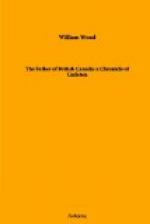If such was the happy lot of prisoners during the war, what was the wretched lot of Loyalists after the treaty of peace? The words of one of the many petitions sent in to Carleton will suggest the answer. ’If we have to encounter this inexpressible misfortune we beg consideration for our lives, fortunes, and property, and not by mere terms of treaty.’ What this means cannot be appreciated unless we fully realize how strong the spirit of hate and greed had grown, and why it had grown so strong.
The American Revolution had not been provoked by oppression, violence, and massacre. The ’chains and slavery’ of revolutionary orators was only a figure of speech. The real causes were constitutional and personal; and the actual crux of the question was one of payment for defence. Of course there were many other causes at work. The social, religious, and political grudges with which so many emigrants had left the mother country had not been forgotten and were now revived. Commercial restrictions, however well they agreed with the spirit of the age, were galling to such keen traders. And the mere difference between colonies and motherland had produced misunderstandings on both sides. But the main provocative cause was Imperial taxation for local defence. The Thirteen Colonies could not have held their own by land or sea, much less could they have conquered their French rivals, without the Imperial forces, which, indeed, had done by far the greater part of the fighting. How was the cost to be shared between the mother country and themselves? The colonies had not been asked to pay more than their share.




